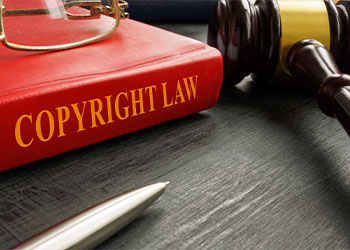What Is Copyright Termination?
June 12, 2024
 Imagine being a songwriter, recording artist, book author, or another creator of copyrighted work and having the right to terminate a grant of copyright in your work that you previously transferred to a third party. This is known as copyright termination and many people are not aware of it.
Imagine being a songwriter, recording artist, book author, or another creator of copyrighted work and having the right to terminate a grant of copyright in your work that you previously transferred to a third party. This is known as copyright termination and many people are not aware of it.
“Is this even legal?” you might be thinking. The short answer to your question is yes, so long as specific requirements are met.
As an intellectual property attorney at the Law Office of Julie Scott LLC, I can help you understand more about copyright termination so you know how you, as the creator of the copyrighted work, can get the rights previously transferred to another person or entity returned to you.
I am licensed to practice in Missouri, California, and before the U.S. Patent and Trademark Office, which is responsible for granting patents and registering trademarks in the United States.
What Is Copyright Termination?
As the name implies, the term “copyright termination” refers to the legal right of an author of copyrighted work to terminate the exclusive or nonexclusive grant, assignment, or license of copyright after a specific passage of time.
This right is also known as the “termination right.” If the author of the copyrighted work is not alive, the termination right may be passed on to their surviving heirs.
Copyright termination, as a legal concept in copyright law, was created by the Copyright Act of 1976. This Act provides authors of copyrighted work who didn’t realize the future value of their work with an opportunity to reclaim rights to their original creations.
Which Works Aren’t Eligible for Copyright Termination?
Nearly all types of creative works are eligible for copyright termination as long as they meet the requirements outlined in the Copyright Act. Some examples of eligible works include music, artwork, and books. However, some copyright grants cannot be terminated.
Under Section 203, grants of copyright, assignments, and licenses made on or after January 1, 1978, cannot be terminated if:
The author is still alive, and the grant was made by anyone other than the author
The author is no longer alive, and the grant was made by anyone other than their statutory heirs
The grant was made by will
Under Section 304, grants of copyright, assignments, and licenses made before January 1, 1978, cannot be terminated if:
The grant was made by anyone other than the author
The grant was made by will
Also, the termination right cannot be exercised if the work was made “for hire.” However, determining which works were made for hire and which weren’t is not straightforward and may require assistance from a copyright attorney.
A Step-by-Step Guide to Copyright Termination
Requesting a copyright termination is a four-step process that requires meticulous preparation and attention to detail:
Establish the effective date when the work was created or when the rights were transferred to a third party. You can find this information by searching the Copyright Office records or looking at the copyright registration certificate if you have one.
Determine when the copyright termination “windows” opens. According to the Copyright Act, this window is the period within which you can recapture ownership of your copyrights. For works created before January 1, 1978, the window opens after 56 years from (a) January 1, 1978, or (b) the date the copyright was secured, whichever is later. For works created after January 1, 1978, the window opens after (a) 40 years from the date the grant was executed or (b) 35 years from the date the work was published. For both works created before and after January 1, 1978, the right to recapture the copyright is valid for five years from the date the window opens.
Select any date within the five-year period. You can choose any date within five years from the date the copyright termination window opens.
Send a proper termination notice. You must serve a copyright termination notice to the current copyright owner no less than two years and no more than 10 years before the date you select in step three. For example, if you created your copyrighted work in 1990 and want to terminate a license in 2025 (35 years later), you must file a termination notice between 2015 and 2023. If the copyright owner ignores the notice, copyright termination will take effect. Alternatively, the owner can reach out to the author of the copyrighted work and negotiate a new agreement before the window closes.
If the process seems confusing, you might want to get help from an experienced intellectual property attorney. Your attorney will make sure that you don’t make any mistakes and do not lose your copyright termination right.
Personalized Guidance to Copyright Termination
If you are an author of a copyrighted work and would like to discuss your options for recapturing ownership, contact the Law Office of Julie Scott LLC. I also assist those who currently own a copyright of any kind and would like to learn more about how they can protect themselves from copyright termination, infringement, and other actions.
Reach out to request a consultation today to discuss your situation.
